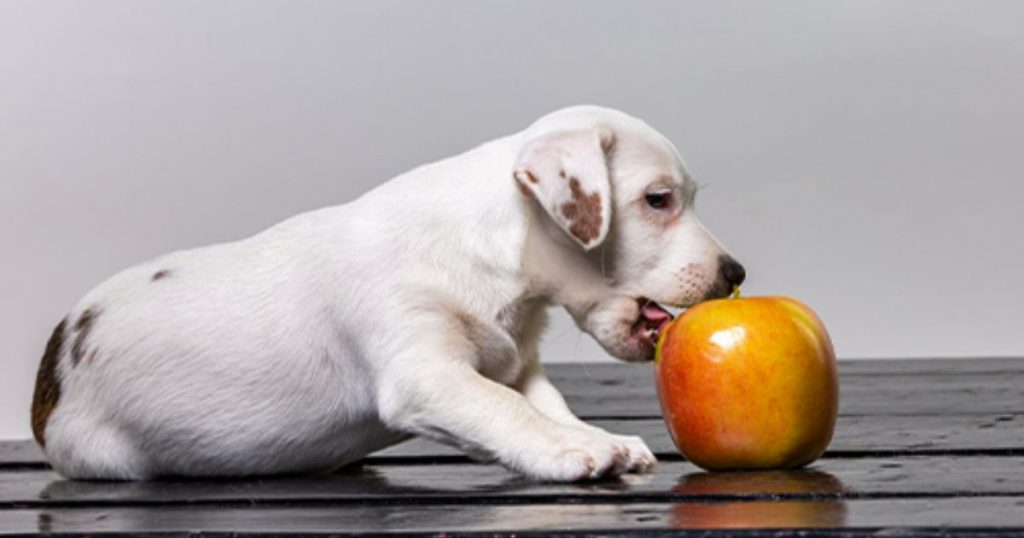When feeding our canine companions, ensuring they consume safe and nutritious foods is a top priority. Among the myriad of fruits available, apples are often a popular option. But can dogs eat apples? When prepared properly, apples may be a nutritious supplement to a dog’s diet and are generally safe for them. There are some restrictions to consider, though, and it’s critical to comprehend the advantages and possible drawbacks of giving apples to dogs. In this comprehensive guide, we’ll explore everything you need to know about feeding apples to dogs, including their nutritional benefits, how to serve them safely, can dogs have apples and alternative treats to consider.
Why Are Apples Good for Dogs?
Apples are a nutritious and delicious snack that can benefit dogs in several ways when offered in moderation.Vitamins A and C are abundant in apples. which boost your dog’s immune system and keep their skin and coat healthy and lustrous. Their fiber content aids digestion and can be particularly beneficial for dogs with occasional stomach upset or irregular bowel movements. Apples are a great treat for dogs that need to keep their weight in check because they are low in calories and fat. The crunchiness of apple slices can also promote dental health by helping to clean teeth and freshen breath as your dog chews. Additionally, apples contain antioxidants, which support overall health and can lower the chance of developing some long-term illnesses.
However, it’s important to serve apples are apples good for dogs properly to ensure they’re safe for your furry friend. Always remove the seeds and core, as apple seeds contain trace amounts of cyanide that could be harmful if consumed in large quantities. Offer small, manageable slices to prevent choking. Occasionally, including apples as a treat can make your dog’s diet more varied and nutrient-dense. As with any new food, consult your veterinarian before introducing apples to your pet, apple allergies in dogs especially if they have dietary restrictions.
Rich in Vitamins
Apples are packed with vitamins that are essential for your dog’s health:
- Vitamin A: Promotes healthy vision, skin, and coat.
- Vitamin C: increases the body’s defenses and can support joint health, especially in older dogs.
Apples’ high fiber content facilitates better digestion. Fiber promotes gut health and helps control bowel movements, which is especially advantageous for dogs with sensitive stomachs or periodic constipation.
Low in Calories
Apples are a low-calorie treat for dogs on a weight management plan. They provide a satisfying crunch without adding excessive calories, making them a guilt-free indulgence.
Antioxidants
Apples are rich in antioxidants, particularly in the peel, which help combat free radicals. This can reduce inflammation, lower the risk of are apple seeds poisonous for dogs with chronic diseases, and promote overall can dogs have granny smith apples health.
Hydration
With their high water can dogs eat green apple content, apples can help your dog stay hydrated, especially during hot weather or after is apple bad for dogs’ exercise.
How to Safely Feed Apples to Dogs

When given properly, apples may be a tasty and healthy treat for your dog. They’re a nutritious snack that’s rich low in fat, high in fiber, and rich in vitamins A and C. fiber, and low in fat. However, taking precautions is essential to ensure your dog enjoys this fruit safely. Start by washing the apple thoroughly to remove any pesticides or dirt. Always remove the seeds and core before serving, as apple seeds contain trace levels of cyanide, which, if ingested in excessive numbers, can be hazardous to dogs. Additionally, the core is a choking hazard and can cause intestinal can dogs have green apples Can Dogs Eat Cashews blockages.
Start by washing the apple thoroughly to remove any pesticides or dirt. Always remove the seeds and core before serving, as apple seeds contain trace levels of cyanide, which, if ingested in excessive numbers, can be hazardous to dogs. Additionally, the core is a choking hazard and can cause intestinal blockages.size. Smaller chunks are safer for small dogs. Offer the pieces as occasional treats rather than a regular meal replacement. Keep an eye out for your dog’s itching or other symptoms of an allergic are apples ok for dogs response.
Digestive upset, as some dogs may be sensitive to apples. Avoid feeding your dog apple-flavored products like pies or applesauce, as these often contain added sugars, artificial sweeteners, or harmful ingredients. You may safely and responsibly give your pet the By taking these simple actions; you can reap the health advantages of this crisp fruit. Before introducing new foods, always get your veterinarian’s approval.
Wash the Apple Thoroughly
Apples are often coated with pesticides, wax, or other residues. Washing them thoroughly removes these contaminants, making the fruit safer for your are apple seeds bad for dogs pet.
Remove the Core and Seeds
The seeds of an apple contain amygdalin, a compound that releases cyanide when digested. While a few seeds are unlikely to cause harm, prolonged exposure or consumption of large quantities can be toxic. Additionally, the core is a choking hazard and difficult for dogs to digest.
Cut Into Bite-Sized Pieces
To avoid choking, cut the apple into small, manageable pieces. especially in smaller dogs. This will also make it easier for your dog to enjoy the fruit without risk.
Moderation is Key
Despite their health benefits, apples contain natural sugars. If given in large quantities, overfeeding apples can lead to gastrointestinal upset or even contribute to weight gain.
Potential Risks of Feeding Apples to Dogs
Feeding apples to dogs can be a healthy treat, but there are potential risks. Small levels of cyanide, which can be poisonous, are present in apple seeds. If consumed in large quantities. Always remove seeds and the core before offering apples to your pet. Additionally, apple skins may be difficult for some dogs to digest, leading to gastrointestinal upset such as vomiting or diarrhea.
Overfeeding apples due to their sugar content can worsen diseases like diabetes or lead to weight gain. Some dogs may also have allergies or sensitivities to apples, causing itching or other allergic reactions. To ensure safety, introduce apples Can Dogs Eat Apples gradually and in moderation, consulting your veterinarian for advice tailored to your dog’s dietary needs.
Choking Hazards
The apple core and large chunks can be a choking hazard. Always remove the core and slice the fruit into appropriate sizes. Feeding too many apples, especially to dogs not accustomed to high-fiber foods, can cause digestive upset. Signs include loose stools, diarrhea, or an upset stomach.
Allergic Reactions
Although rare, some dogs may have an allergic reaction to apples. Look for signs like stomach distress, swelling, or itching. If any of these occur, discontinue feeding apples and consult your veterinarian.
While apples are a natural sugar source, People with diabetes or at risk for obesity should only have apples in limited quantities. Always consult your vet if your dog has a health condition that may be affected by sugar intake.
How Much Apple Can Dogs Eat?
Apples are a healthy dog treat packed with vitamins A and C, fiber, and antioxidants. However, moderation is key. Dogs can enjoy a few apple slices as a snack, but avoid giving them too much as it may upset their stomach due to the natural sugar content. Apples are a healthy dog treat packed with vitamins A and C, fiber, and antioxidants. However, moderation is key. Dogs can enjoy a few apple slices as a snack, but avoid giving them too much as it may upset their stomach due to the natural sugar content. Always remove the core and seeds, as apple seeds contain cyanide, which can be toxic in larger amounts. One or two slices are enough for small dogs, while larger dogs can have three to four slices.
Apples make a great occasional treat, but they should never replace a balanced diet. If introducing apples, start small and monitor your dog for adverse reactions like diarrhea or allergies. Which can be toxic in larger amounts. One or two slices are enough for small dogs, while larger dogs can have three to four slices. Apples make a great occasional treat, but they should never replace a balanced diet. If introducing apples, start small and monitor your dog for adverse reactions like diarrhea or allergies.
Creative Ways to Serve Apples to Dogs

Apples can be a nutritious treat for dogs when served creatively and safely. Slice apples into bite-sized pieces for a crunchy snack, ensuring the seeds and the core are removed. For a refreshing twist, freeze apple slices or blend them into icy apple popsicles using unsweetened applesauce and water. Mix diced apples into your dog’s food for flavor, or bake apple slices into simple dog-friendly treats with oats and peanut butter. Create a fun puzzle by stuffing small apple chunks into a Kong toy with yogurt. Always introduce apples in moderation to avoid digestive upset. These creative methods turn a healthy fruit into a fun, tasty, and safe treat your pup will love.
Frozen Apple Treats
Freeze small apple chunks for a refreshing treat, especially during summer. Frozen apples can also help soothe teething puppies. For a high-protein snack, lightly coat apple slices with dog-safe peanut butter. Make sure the peanut butter is free of xylitol, a harmful dog sweetener.
Apple Puree
Blend peeled apples into a puree and add a spoonful to your dog’s regular food for a burst of flavor. Dehydrate apple slices to create crunchy, long-lasting treats. Avoid adding sugar or spices. Incorporate apples into homemade dog biscuits or mix them with other dog-safe fruits for a fruit salad.
Can Puppies Eat Apples?
Yes, puppies can enjoy apples, but Can Dogs Eat Apples their small size and sensitive stomachs mean extra precautions are necessary. Start with tiny, peeled pieces to ensure they can easily chew and digest the fruit. Introduce apples gradually to monitor for any adverse reactions.
Apples to Avoid: What Not to Feed Your Dog
Apples can be a healthy dog treat, but not all parts are safe. Apple seeds contain amygdalin, which releases cyanide when chewed or digested, posing a toxic risk to your pet. Similarly, avoid feeding dogs apple stems, as they can also contain harmful compounds. Rotten or moldy apples are a no-go due to potential mycotoxins that could upset their stomach or cause severe illness.
Always remove the core to prevent choking hazards. Stick to fresh, plain apple slices as a safe option. While apples are a nutritious source of fiber and vitamins, being mindful of the parts and condition of the fruit ensures your dog enjoys their treat safely and without risk.
- Apple Pies or Desserts: These often contain sugar, spices, and other ingredients (like nutmeg) that can harm dogs.
- Apple Juice: Store-bought apple juice is typically loaded with sugar and may contain preservatives.
- Candied Apples: These are high in sugar and often coated with ingredients that are not dog-friendly.
- Rotten Apples: Fermented apples produce ethanol, a type of alcohol that is toxic to dogs.
Can Dogs Eat Apple Skins?
Yes, apple skins are safe for dogs and contain many fruit nutrients. However, the skin may be harder to digest for sensitive stomachs, so consider peeling the apple if your dog experiences any issues.
Alternatives to Apples for Dogs

Apples are a healthy dog treat, but many other fruits and vegetables are just as beneficial. Carrots are a crunchy, low-calorie option rich in vitamins and great for dental health. Blueberries provide antioxidants and are perfect for a bite-sized snack. Watermelon, without seeds or rind, is hydrating and refreshing in the summer. Bananas offer natural sweetness and potassium, though they should be given in moderation
Green beans, either raw or steamed, are low-calorie and fiber-packed. Sweet potatoes, cooked and plain, are a nutrient-rich alternative dogs often love. Always introduce new foods gradually, avoid toxic items like grapes or onions, and consult your vet to ensure your dog’s diet is balanced and safe.
Conclusion:
Dogs can enjoy apples as a tasty and healthy snack. when prepared properly. They provide essential vitamins, fiber, and antioxidants while being low in calories and fat. However, it’s crucial to feed apples in moderation and avoid the core and seeds to prevent any risks. As with any new food, consult your veterinarian if you have concerns about introducing apples into your dog’s diet. With proper preparation, apples can be a delightful addition to your dog’s treat repertoire, offering both health benefits and a tasty reward.By understanding how to serve apples safely, you can enjoy sharing this classic fruit with your canine companion while supporting their health and happiness.
FAQ:
Can Dogs Eat Green Apples?
Yes, dogs can eat green apples but are tarter than red apples. Some dogs may prefer the sweeter taste of red apples.
Are Crab Apples Safe for Dogs?
No, crab apples are not recommended for dogs. They are more likely to cause digestive upset and contain higher concentrations of compounds that can be harmful in large quantities.
Can Diabetic Dogs Eat Apples?
Diabetic dogs can eat apples in small quantities, but consult your vet to determine the appropriate amount.
Can Dogs Eat Cooked Apples?
Yes, cooked apples without added sugar, spices, or butter are safe and can be a soft, easy-to-digest treat.
